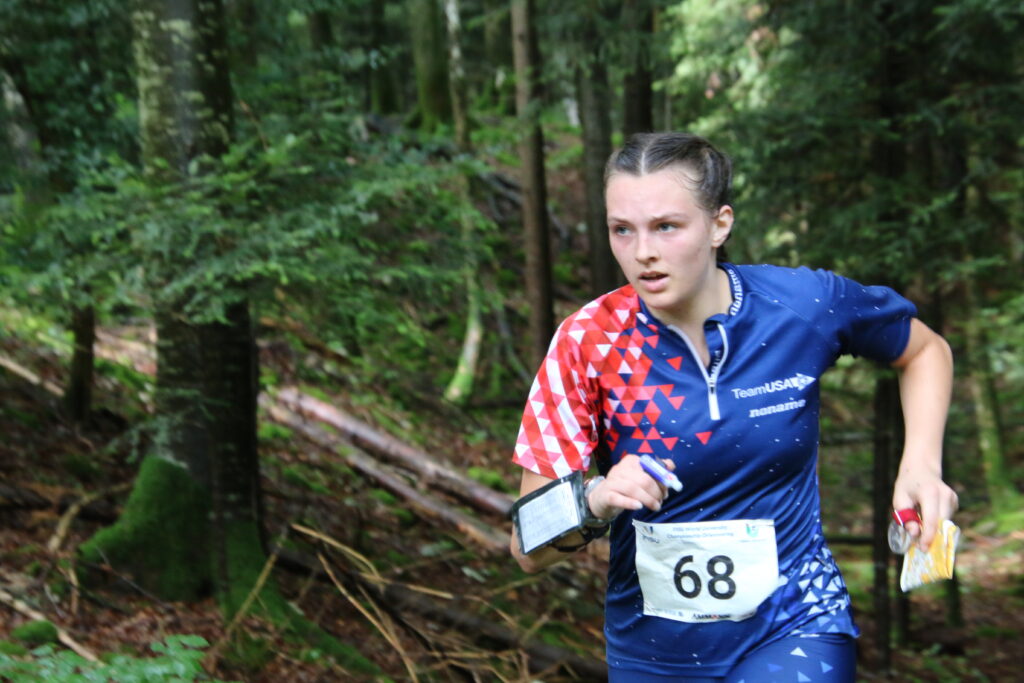Whether traversing new frontiers or old, Jessica Colleran keeps moving forward.
The third-year computer science major, along with University of Washington teammates Curtis Anderson and Annika Mihata, recently won the Orienteering USA (OUSA) Junior National Intercollegiate Championships, which were held in Georgia earlier this year. Their victory marks the first time in more than two decades that a team other than West Point has taken home the trophy.
“When I came to UW, I found a group of people who were excited to compete nationally and being able to be surrounded by a team was very exciting,” Colleran said. “It’s hard to describe the sheer elation we felt when Annika, our last runner of the day, came across the finish line and we realized her time was fast enough to clinch our two-day victory.”
Navigating challenging terrain has become second nature for Colleran, who juggles life as a member of the OUSA national team with her studies in computer science, as well as minors in climate science and physics. She won her first competition in elementary school, kindling what would turn out to be a continued passion for exploration into the unknown.
Orienteering, a sport in which athletes race toward checkpoints using map-reading and directional skills, combines the physical with the mental. For Colleran, who developed an early affinity for puzzles and the outdoors, it was a perfect fit.
“Being active, having a technical component and being in nature sparked all three of my interests,” she said. “It wasn’t just running, but a very technical sport that I could exercise my brain with.”
Colleran’s accomplishments have taken her to landscapes far afield. In 2021, she was named to the OUSA Junior World Orienteering Team that competed in Kocaeli, Turkey. Last year, as part of the World University Championships Orienteering Team, she raced through alpine glades near the city of Biel in Switzerland.
But back at UW, her horizons are no less grand. She plans to combine her varied academic interests to combat climate change, seeing computer science as a pathway for exploring technologies geared toward clean and renewable energy. Orienteering, she said, gave her an innate appreciation for nature — a chance to connect with sights and sounds only found when getting lost. A swishing streambed, the snap of a twig, wind rustling the leaves before they crunch underfoot.
“I have been lucky to explore so many places through orienteering,” she said. “Especially in forests or nature that one wouldn’t usually find themselves in.”
Academics, higher education and UW hold places of high esteem in the Colleran family. Colleran’s parents, Allen School alum John Colleran (B.S., ‘87) and UW Psychology alum Michelle Kastner (B.S., ‘88) established the John Colleran and Michelle Kastner Colleran Endowed Scholarship in 2011. The scholarship supports outstanding undergraduate students in computer science or computer engineering for whom the cost of a UW education would be a significant personal or family financial hardship, but who do not qualify for traditional need-based grants or scholarships. John has been at Microsoft in the Operating Systems Group for more than three decades. Michelle is the Allen School’s representative to the UW Foundation Board.
As for the recent competition at nationals, Colleran recognizes success as a culmination of collective grit, crediting her teammates and family for their support.
“They’re my true compass,” she said.

Anderson, for instance, overcame a sprained ankle late in the competition. Adrenaline kicked in, Colleran recalled, and powered him through the rest of the race. Anderson is a fourth-year student majoring in environmental engineering. Mihata, Colleran’s teammate on the U.S. National Team, is a first-year student intending to major in psychology.
The trio previously competed against each other in the Washington Interscholastic Orienteering League (WIOL) and at other meets organized by the Cascade Orienteering Club, before coming together this year to compete for the title.
“We have gotten to know each other as both competitors and friends,” Colleran said. “I was really glad I could organize a new group of three from UW.”
Colleran relishes the thrill of competition, the thrum and vim of pounding feet, a quickening pulse tempered by a cool head. For this student-athlete, there is crossover among her callings. Finding a path, she said, requires “collecting features” — prominent landmarks or observable characteristics that act as anchors. With enough features collected, a mental map begins to form.
Or, in other words, divide and conquer.
“Being a computer science student takes a lot of time management skills and learning how to prioritize and set schedules,” Colleran said. “Often when I feel stressed about being assigned a lot of work in a week, I like to think about breaking it down like I would an orienteering leg as it makes a large workload seem manageable.”
For now, she’ll continue to explore new frontiers, whether they’re technological or terrestrial in nature. Another example of her shared passions: This summer, she has an internship in the San Francisco Bay Area, home to the North American Orienteering Championships taking place in July.
“Keeping your cool under pressure, finding a path, navigating the unknown — I think there are a lot of lessons that the sport teaches you and that translate to being a student, especially one nearing graduation,” Colleran said. “Whatever the challenge, you have to keep going.”


